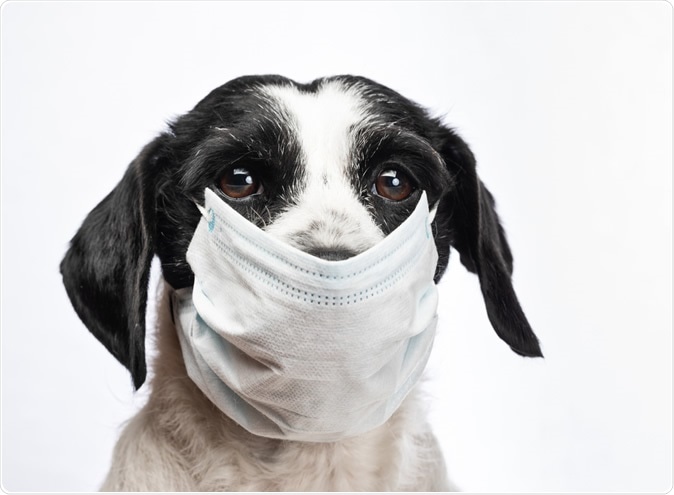The big question now is, should this be a concern? Researchers advise pet owners to hold on before flying into a fright.

Image Credit: Thais Ceneviva / Shutterstock
Coronavirus infections in cats
Cats do get coronavirus infections very commonly (25% to 40%), especially in households with multiple cats (80% to 100%). The viruses involved are alpha-coronaviruses, not, as in humans, beta-coronaviruses. These viruses typically cause mild transient diarrhea, but rarely undergo mutation to other strains which cause a more severe illness called feline infectious peritonitis (FIP). This presents with varying grades of fever, lethargy, and loss of appetite, for days or weeks, after which other signs appear.
COVID-19 in dogs?
With respect to the dogs, the fact that the owner of the first dog was positive for the virus led to the dog being tested using nose and throat swabs, which showed that the virus was positive. This has led to a lot of hype as to the potential for dogs and cats to be infected, fall sick, pass the virus to humans and so on. In this case, too, the presence of replicating infectious viral particles is yet to be proved.
The exact period of viability for the SARS-CoV-2 virus in the environment is yet to be established. Extrapolating from what is known about the other coronaviruses, it is quite possible that under the right conditions, the virus could remain infectious for days. Moreover, the dog could well act as a source of contamination if respiratory droplets landed on its fur and remained on it. If it licked that place, that could explain the presence of viral particles in its throat.

Image Credit: Dmitry Naumov / Shutterstock
Why viruses have specific hosts
No instance exists when a human coronavirus infected dogs, or vice versa because a virus doesn’t just jump species, for very good reasons – viruses are specifically adapted to certain hosts. If a virus has to attach to and infect a host cell, the cell must have specific proteins called receptors to which the virus can bind. The SARS-CoV-2 binds to the proteins ACE2 and TMPRSS2, which are different in dogs from the human version and therefore, may not act as efficiently as in humans. Even if binding occurs, no case of symptomatic infection has occurred in dogs.
The Pomeranian tested showed only low virus levels. It is not yet clear as to what viral load is required to infect a human. However, the dog-to-human spread is not likely to be nearly as efficient as the human-to-human spread. Moreover, despite millions of cases of norovirus transmission between dogs each year, only one case of its spread to a human has ever been proved.
Is pet transmission possible?
With respect to the sick cat, the first possibility is that the cat ate infected food and the virus was simply a transient passenger through the gut, rather than an actively replicating and infectious agent. To show the latter, many more tests are required. If a large amount of viral genes were present in the cat samples, it might be true that the virus was replicating in the gut. But this data is not available in the relevant study.
Secondly, there is a possibility that the presence of the viral genome was just a coincidence with the appearance of respiratory symptoms and loose stools due to any of a long list of feline ailments. To resolve this difficulty, the clinical details of the cat’s illness must be known – and right now, these are unknown.
Testing throws up only negatives
The fact is that a large diagnostic laboratory for animal pets has issued a recent statement that they “have now tested thousands of cat and dog samples for SARS-CoV-2 with no positive cases.” Since the number of human COVID-19 cases is fast approaching the 1 million mark worldwide, it would appear obvious that if there was a possibility of this disease in pets, it would have manifested widely by now. In short, there is no evidence that pets can get this virus so far.
The take-home is, as always, the need to practice good hygiene. Mannerly sneezing or coughing into clean tissue, washing hands thoroughly before and after touching pets, keeping pets clean, and avoiding face-to-pet contact will all help contain the spread of the virus between humans and in the worst-case scenario, between humans and pet animals.